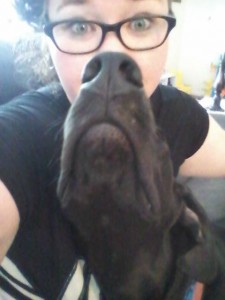
FOSTER TRAINER PROGRAM
What is a Foster Trainer and how does the program work?
Buckeye Service Dog uses a decentralized business model, which means we don’t have a training facility or dog kennel where we keep large numbers of dogs. Instead, a dog is custom- selected for each BSD client. The dog begins its training by being evaluated for temperament, healthy, and trainability at the home of BSD Owner, Christy Talbert. When a dog passes it’s training, it moves on to spend 3-5 months with a BSD Foster Trainer (FT)
Each of these trainers keeps a dog in training at their home. This dog lives with the trainer and their family as a pet in the home, and accompanies the FT on the outings of daily life such as the mall, college, movies, errands etc. In addition to teaching the trainee house manners and socialization, Foster trainers meet with our training team weekly (typically on Wednesdays at noon or 6pm). During these team training sessions each trainer works with their dog in front of the team and is coached on the next steps to training their dogs. BSD trainers typically work on teaching their dogs specialized skills about 15 minutes twice daily. At the end of the dog’s foster training, it comes back to Christy for the completion of its training and eventual placement as a service dog.
While this model does not include a showy training facility (Christy lives in an old farmhouse!), there are several benefits to the decentralized approach:
- Our dogs spend their time living in a home rather than in a kennel situation. This allows us to get to know our dogs very well and assess not only their skills but how they interact in the home situation. It also allows many of our rescue dogs, who have never experienced real love or bonding, to enjoy a home environment.
- BSD is able to keep costs down because we are not paying rent on a facility, nor employing a staff to care for the facility and a kennel of dogs.
- Foster trainers at BSD enjoy a role that goes well beyond just taking a dog out in public. Instead, our trainers learn to teach complex behaviors and see their dog blossom into a fully trained service dog.

Would you like to learn more about service dog training? If you are able to answer “yes” to the following questions, please email Christy at BuckeyeServiceDogs@gmail.com for additional information.
- You live in Central Ohio and are able to attend our weekly sessions.
- Your home can provide a safe and positive environment for our dogs, and are able to keep a trainee dog in your home.
- You would enjoy taking a dog with you in pubic as part of your regular routine.
- Others in your household are supportive.
Do Foster Trainers get paid?
All BSD Foster Trainers begin as volunteers. The typical foster trainer might begin by watching dogs in training for short periods of time (for example, if a trainer goes on vacation, you might dog-sit). This allows each candidate to figure out if they enjoy having a BSD dog in their home and taking it in public with them.
You will then be assigned a dog to go through the training process (3-5 months). Typically, you will train your first dog as a volunteer.
Foster Trainers who have gained some experience with us are paid a lump sum on a per (completed) dog basis.
Who pays for the dogs’ care?
BSD pays for all of your dog’s expenses, supplies, etc. The only expense you will incur is transportation to our weekly sessions or other outings.
Who makes good Foster Trainers?
Just about anyone who loves dogs and wants to learn to train them might be a good candidate. Typically, many students and stay-home moms enjoy training our dogs as a way to give to the community while earning some extra cash without the need to change their schedule or find babysitting.
For more information, contact Christy at BuckeyeServiceDogs@gmail.com.

PUPPY PARENT PROGRAM
What is a Puppy Parent?
A Puppy Parent is a volunteer who cares for, trains, and socializes an adorable, sweet, fuzzy, soft, messy, loud, and obnoxious ball of fluff. Typically, a Puppy Parent will receive a puppy that is from 2-5 months old and keep it until it’s 8 months to 1 year old.
What are the commitments?
Puppy parents teach their adorable heathens house manners such as housebreaking (cleanup, aisle 5!); crate training (who needs sleep, anyway?); and appropriate human interaction (no, a human hand is not a chew toy!).
They socialize their bundles of joy in a variety of settings, and teach it to enjoy meeting new people and engaging in new activities.
Puppy parents commit to meeting with BSD staff on at least a monthly basis, although they are welcome to attend as many of the weekly Foster Team training sessions as they are able. Puppy Parents also make vet appointments and transport their charges to and from our vet near Galena, Ohio.
Does BSD always have puppies available?
No. Our philosophy at BSD is obtain adolescent or young adult dogs for training whenever possible. We view purchasing/raising puppies as a final resort. Why?
First, We only purchase puppies when we are unable to locate young adults with characteristics we need. Typically, the hardest dogs for us to procure are tall, calm dogs suitable for mobility. We tend to use very large standard poodles and great Dane mixes as mobility dogs. Neither of these are easy to obtain on a frequent basis. So, we must sometimes purchase and raise puppies.
Also, puppies are expensive to purchase and raise. Typically a puppy is in our care six to eight months longer than the young adult dogs we train.
Lastly, puppies are, to put it bluntly, a pain in the butt. They poop and pee, whine, chew, jump, and engage in a host of other behaviors that must be brought under control. That means being a puppy parent is a tough job!
You might be a good puppy parent if…
- You do not have a full time job out of the home
- You live in a situation where a whining/yipping young puppy is not going to cause problems
- You can maintain a safe environment for a puppy
- Your housemates are on board and ready for your perfect blend of cuteness and chaos
- You are able to meet with BSD staff at least monthly
